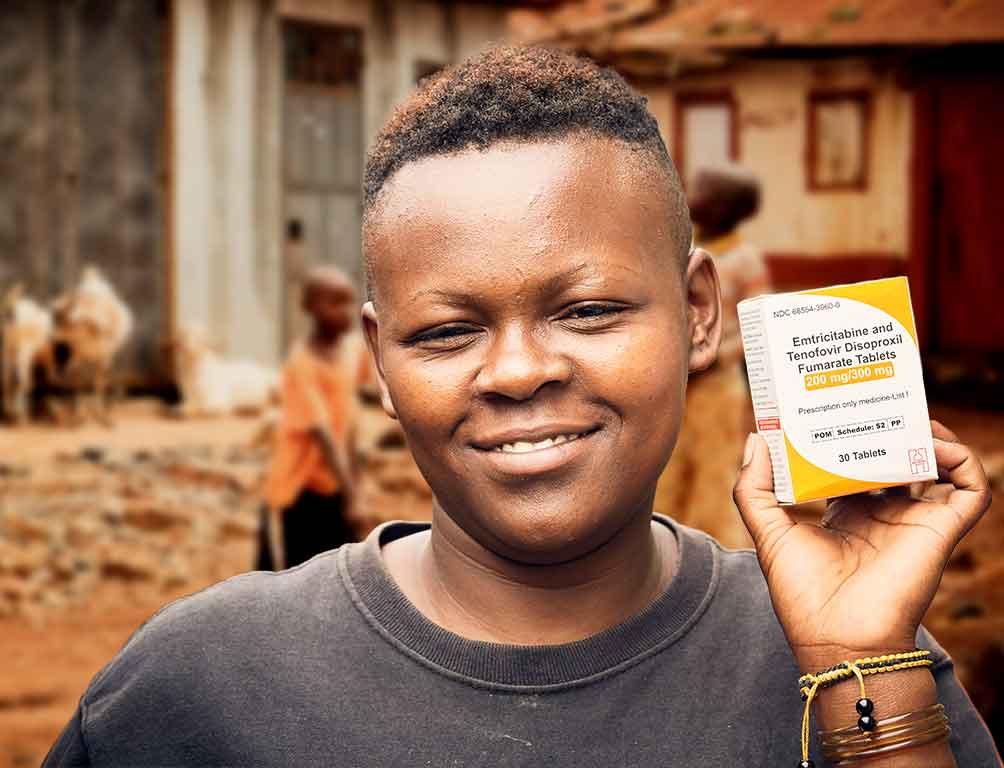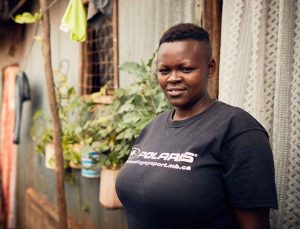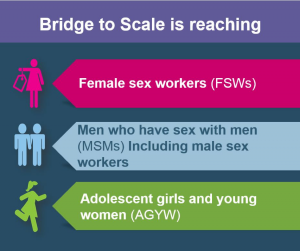
Pre-exposure prophylaxis offers peace of mind to people at continuous risk of HIV infection
Nairobi, Kenya — In the outskirts of Nairobi is the sprawling Kangemi informal settlements. The slum is bustling with people; some cooking outside their shacks, others burning charcoal to sell or busying themselves with their food stalls. The sky is overcast and the air is cold. At the hall hired for the day’s outreach, bedsheets serve as makeshift partitions. This outreach is unique: Here, for the first time in Kenya, eligible clients will have access to pre-exposure prophylaxis (PrEP).
PrEP is a pill taken once daily by HIV-negative people who are at continuous risk for HIV infection. In Kenya, Jhpiego—through the Jilinde project—is scaling up the use of PrEP into a large-scale public health response. Over 20,000 people at continuous risk of HIV infection will receive oral PrEP, which will be integrated within existing HIV combination prevention services.
Today’s outreach gives clients access to HIV testing and counseling services, antiretroviral therapy and PrEP. Among those getting their first dose of PrEp is Cynthia, a warm and candid 25-year-old sex worker.
Born and raised in Nairobi, Cynthia was introduced to sex work as a teen, after the birth of her daughter. “My father deserted us and my mother struggled to take care of my siblings and I,” she explains. At 15, she dropped out of school to look for a job so she could feed her baby. When no opportunities arose, her cousin, a sex worker, told her how she could earn earn between 2,000–3,000 KES per night (the equivalent of about $20 to $30), and $5,000 KES ($50) on weekends. Most of the clients are men 35 and older, from wealthy neighborhoods surrounding Kangemi slum.
Too good to be true?
Conventional protection isn’t always easy or even possible, Cynthia says: “Sometimes, clients pay extra for condom-less sex and sometimes a condom bursts.” She has also been forced to have sex with policemen to buy her freedom when arrested.
When Cynthia first heard about PrEP from a Jilinde-trained peer educator, it sounded like a scam, too good to be true. “My first thought was, there is no cure for HIV, so how could there then be a pill that prevents HIV?” Only when she saw PrEP in the media did she begin to believe it was a real drug and seek more information.
The Jilinde project is scaling up the use of PrEP in Kenya within existing combination prevention services to people like Cynthia who are at high risk of HIV. More than two million people acquire HIV infection globally every year. In Kenya, in 2015, 71,034 people aged above 15 years and 6,613 aged 0–14 years got infected with HIV. This translates to 77, 648 Kenyans requiring lifelong antiretroviral treatment to keep them alive and prevent further transmission of HIV.
The Jilinde project is set to demonstrate the incredible potential of PrEP by generating evidence that population-level PrEP interventions are feasible and effective in low- and middle-income countries that bear the brunt of the world’s HIV burden.
For Cynthia and so many others like her, the time for PrEP is now.
“I don’t like the sex work and hope that one day I can start my own food business,” she says. “But for now, PrEP gives me peace of mind because I know that I can keep HIV at bay.”
Jhpiego Presents PrEP Scale Up in Kenya: Bridge to Scale Project at IAS 2017
Jhpiego’s Daniel Were represented the Kenyan oral PrEP scale-up project at a WHO-sponsored satellite session during the 9th International AIDS Society Conference on HIV Science in Paris. Co-presenters included U.S. Global AIDS Coordinator Ambassador Deborah Birx; Rachel Baggaley of the HIV department at WHO; Yogan Pillay of the National Department of Health, South Africa; South African epidemiologist Quarraisha Abdool Karim; Sheena McCormack, a clinical epidemiologist at UCL; and Jean-Michelle Molina, an infectious disease specialist at the University of Paris Diderot. Moderating the session was Dr. Wafaa El-Sadr, founder and director of ICAP.
Oral PrEP Works!
A daily dose is more than 90% effective in preventing HIV.
The World Health Organization (WHO) recommends oral PrEP to anyone at substantial risk for becoming infected with HIV and includes PrEP on the Essential Medicines List. A dozen clinical trials have proven that taking oral PrEP as prescribed prevents HIV.*
*Fonner VA, Dalglish SL, Kennedy CE, et al. 2016. Effectiveness and safety of oral HIV preexposure prophylaxis for all populations. AIDS. 30(12):1973–1983. doi: 10.1097/QAD.0000000000001145.
Who Needs Oral PrEP?
Anyone who is HIV-negative and at substantial risk of becoming infected with HIV
Examples of those who may particularly benefit from PrEP include:
- adolescent girls and young women in areas where HIV is common
- HIV-negative men or women in a relationship with an HIV-positive person
- men who have sex with men
- sex workers
- those with behavioral risks that make it easier to get HIV
Bridge-to-Scale in Kenya
- One of the largest national oral PrEP programs
- Scale-up of routine oral PrEP services to over 22,000 people at risk for HIV
- A global learning laboratory for governments and stakeholders considering oral PrEP policy and programs
- Support from the Bill & Melinda Gates Foundation
The Jhpiego Difference
- Trusted relationships with governments and international stakeholders
- Close collaboration with WHO to make oral PrEP web-based training available to clinicians and pharmacists
- Proven experience scaling up large and challenging interventions
- Prior experience translating science to public health practice that is affordable, effective and sustainable





